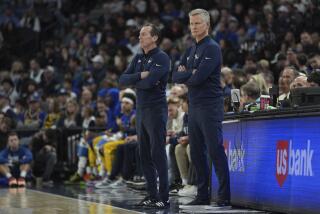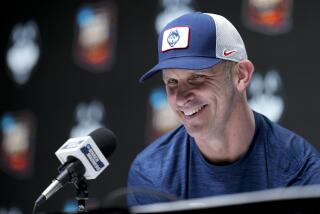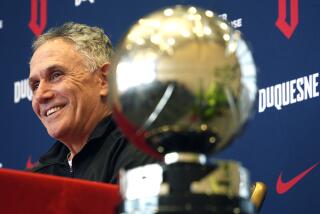Coaching Is Only One Part of the Job
INDIANAPOLIS — They are here, the coaches say, to celebrate the game of basketball and the young people who play it. And the coaches are here to celebrate how well they do their jobs in spite of all the obstacles set in their paths to the Final Four.
Look at what the lure of the NBA has done to college basketball. Just look at what these Final Four coaches have done to mold younger players into champions. Coaches are a greater factor than they’ve been in years.
Now think of how hard it’s going to be next year when scholarship athletes can have jobs to earn the difference between scholarship benefits and what it actually costs to go to college. Just think of how the premium has increased on recruiting the high school player who can make an impact right away. Double-edged swords are hard for college coaches to handle.
What they’re saying on the days each coach tells the world what gentlemen his coaching rivals are, is that they need help to protect themselves from each other. Oh, certainly they trust Dean Smith, Lute Olson, Rick Pitino and Clem Haskins; they’re here. But some of the others?
Just think what a team Smith would have if Jerry Stackhouse, Rasheed Wallace and Jeff McInnis were back as seniors. “I can’t get over how fine-tuned their offense is at this point,” Olson said.
And what would Pitino have if he was defending Kentucky’s championship with Walter McCarty and Antoine Walker, if they hadn’t gone to the money?
Good coaches have learned to suffer with freshmen in key roles at the beginning of the season and turn them into veterans by tournament time. Ed Cota, trusted to play point guard by Smith, is a freshman. Olson’s wonder guard at Arizona is freshman Mike Bibby. Pitino will start three sophomores and a freshman in 6-foot-10 center Jamaal Magloire.
“Typical of most high school basketball players,” Pitino said of Magloire, “the first thing they’re thinking of is how long it would take them before they can go pro.”
And what does it take to get that player to campus? The council of basketball coaches has been wringing its hands ever since the larger group of coaches changed the rules to give scholarship athletes the right to work. Mike Jarvis, the George Washington coach, tells about coaching at Boston University and recruiting a young man from Columbia, S.C. “He came with one pair of shoes, a size and a half too small; a Sunday go-to-church sports jacket he must have had since he was a sophomore, two pairs of slacks and no winter clothes to wear in Boston at all,” Jarvis said. “In his high school, they had taken up a collection for him and they raised $20 to send him away to college.”
Jarvis and Mike Krzyzewski of Duke, members of the coaches council, say the typical athletic scholarship falls $1,500 to $2,500 short of actual costs, not counting walking-around money. Who pays the ticket home for holiday for the student-athlete who can’t pay his own way? My son and daughter worked. Isn’t it a good idea to permit athletes to work?
“It’s not about working, it’s about making money,” Krzyzewski said. “If one makes some money, they all want it. And then we introduce people we thought reform was keeping out.”
Do the jobs come from boosters who then take control? Does Duke offer $10 an hour while George Washington promises $15 an hour for less work? Does an employer in the great Research Triangle offer a real job, but tell a player he doesn’t have to come in on game days? Does the coach hire players as babysitters, and at what price?
“We know the history,” Krzyzewski said. “The job of turning the lights on in the gym. Raking leaves where there aren’t any trees.”
Full scholarships are not equal on the same campus. Some pay all the costs. “We’re asking for people who put in the rule, how do you implement it so we don’t have abuses?” Krzyzewski said.
Athletes who are interested in education don’t have much time for work. And that gets back to Pitino’s observation about high school stars who don’t really want to be in college. “All the kids I’ve ever visited said they were interested in getting an education,” Jarvis said. “I know they’re not.”
The NBA, college and high school coaches have distinct agendas. The law says college players are free to become professionals, and so are high school players. “At least have a meeting; right now we’re not doing anything,” Krzyzewski said.
“It’s time for high school coaches, time for parents, to take back the family and the community,” Jarvis said. That has not been the recent course of basketball.
“If you can get into their heads as freshman in high school that it’s more important to get an education and not just play basketball, we can have both,” Krzyzewski said.
If colleges permitted only college students to play college basketball, that wouldn’t be quite the problem. And if college coaches worry about protection from each other, how much can high school coaches change the flow of life?
Krzyzewski used to reap the benefits of players who wanted to be at Duke. So Christian Laettner told Grant Hill how to conduct himself and so on down the line. If you don’t have upperclassmen, the coaching staff has to provide standards, as Haskins did with a Minnesota program that doesn’t have the tradition of Kentucky, Carolina, or even Arizona.
“My dad had a third-grade education,” Haskins said. “He raised 11 kids on thirty five hundred dollars a year. That’s where I got my values. I don’t believe in earrings, long pants and those things. Yes, I have some guys that have tatoos, and some guys that have earrings behind my back. When we go out, they don’t do those things.
“A few more years and I’m going to be forced out of coaching because young people don’t believe in that. And I think coaches give in to that. To get the blue-chip player, I guess you probably have to, and that’s probably why I don’t get that many guys. You have to be very selective in the people you recruit, and that’s why I’ve been selective in Minnestoa, because every kid doesn’t see it that way.”
Pitino reflects that he had too much talent on last year’s team. “We had to get the players to understand that they weren’t going to get the minutes they hoped for,” Pitino said, “and we had to convince Antoine Walker and Tony Delk, Walter McCarty, Ron Mercer and Derek Anderson that in order to win a championship, you have to check your ego in before you ever cross that line. You all have to be for the system, for the wins.
“I’m very surprised at the way we’ve developed because, quite frankly, the preseason for me out of all the years I’ve been at Kentucky was a nightmare.”
Pitino has his job essentially because his predecessor, Eddie Sutton, was caught shipping cash to a recruit. Everybody respects good coaching. The other part is what’s difficult.
More to Read
Go beyond the scoreboard
Get the latest on L.A.'s teams in the daily Sports Report newsletter.
You may occasionally receive promotional content from the Los Angeles Times.










